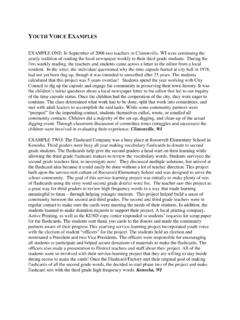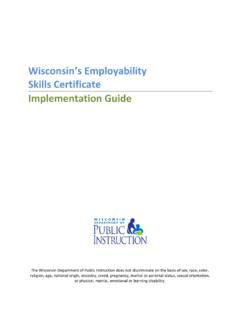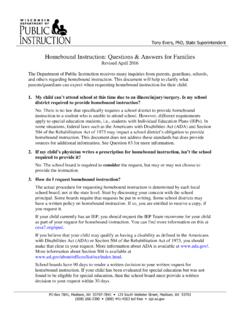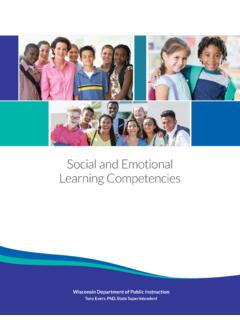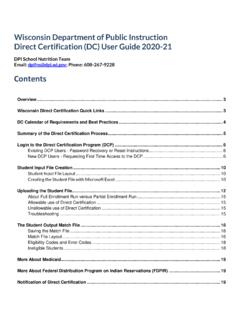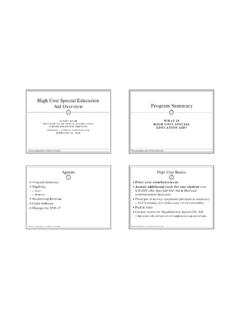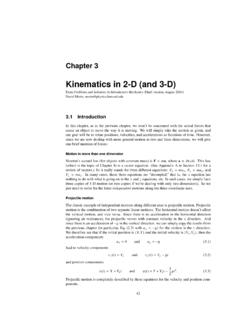Transcription of Teen Self-Care Planning - Wisconsin Department of Public ...
1 1. 2. Teen Self-Care Planning What Is a Self-Care Plan and Why? The Self-Care Plan process and document is designed as a self -discovery tool and conversation starter with youth about their overall well-being. The hope is that youth will feel empowered by the process, which is driven by their ideas, beliefs, and actions. They assess their well-being in eight different areas of their life and consider any new choices they would like to explore as well as the people who can support their choices. The Planning process can help youth to understand the importance of balance across the eight areas of well-being. The Self-Care Plan document is meant to travel with the youth and apply to the various settings of their life.
2 The youth owns their plan and can invite caring adults, both personal and professional, to view the plan as a way to increase understanding and effective supports. Self-Care Plans are: o The result of a process of self -discovery that produces a two-page summary that includes the student's wellness choices, sources of support (natural supports as well as professional supports), ideas for coping with distress, and goals and next steps for the future this summary is ideally electronic and readily available o Done with youth, not to them o A document that grows and changes with the youth o A process that is designed to create a plan that works in different settings of a youth's life o Adjusted through regular check-ins by a trusted adult such as a family member, school staff.
3 Or other professional to assess how the plan is working for the youth o Focused on emerging skills for wellness and coping with distress that need practice and support o Not a consequence to be forced upon a youth it is an opportunity for youth to plan for their Self-Care and wellness practices Self-Care Plans can be used in different settings for a variety of purposes that include one-on- one counseling, group counseling, transition Planning between schools or from treatment or corrections placements, after-school programs, youth in foster care , and with youth with emerging MH issues. They can also be used in a classroom that focuses on teen wellness.
4 Keys to Supporting Self-Care Planning : Take time to build rapport and establish mutual respect before engaging in this process. Respect the emotional space that young people need for their own comfort and protection before diving into such emotional work with them. Focus on collaboration, empathy, reflective listening, affirmations, and avoiding the question/answer trap. The adult facilitator does more listening than talking, evoking the youth's ideas and affirming their insights and strategies. Coach youth to discover the answers within themselves. Avoid shoulds and advice giving. Be patient with silence. Invite deeper thinking and trust young people to share with each other, rather than be too heavy handed in adult facilitation.
5 3. When recording the information for their plan, give choices to the youth about how this is done. Establish ways to maintain privacy. Be realistic about coping skills that are identified in the Self-Care Plans to ensure that they fit the settings the youth are in. Offer unconditional support to the youth whether wellness goals are met or not. Mistakes or setbacks are simply opportunities for further growth and learning. Consider the many benefits to youth completing Self-Care Plans in a group setting: reduces isolation, builds new social connections, capitalizes on positive peer support, provides role play and practice opportunities, the sharing of ideas with peers adds more credibility and relevance, is more cost effective, professionals come and go but peer support can last.
6 If created in groups, spend time on group norms, shared agreements, and confidentiality. Connections to Health Education This Self-Care Plan may be used as a Tier 2 intervention to double dose or enhance the wellness Planning that happens in health education classes for all students. The Self-Care Plan supports the following Wisconsin Standards for Health Education: One Students will comprehend concepts related to health promotion and disease prevention to enhance health. Five Students will demonstrate the ability to use decision-making skills to enhance health. Six Students will demonstrate the ability to use goal-setting skills to enhance health.
7 Seven Students will demonstrate the ability to use health-enhancing behaviors and avoid or reduce health risks. The Self-Care Plan is on the next two pages. Following that are six small-group sessions that can be used to guide youth to complete their Self-Care Plans. The first session introduces and prepares students to use the circle process in sessions two through six. If the youth you are working with already consistently use the circle process, you can begin with session two. Pages 40 41 have a foldable version of the plan. The compass model is adapted from a companion program for all teens found at Thank you for the generous contributions to this document by Kristin Annen, MSW.
8 Milwaukee Public Schools; Project AWARE; and other collaborators. 4. My Self-Care Plan #1 Self-Care Practices that Keep Me Well An adult in my life who supports me in this area: Relationships (what I do to create and maintain healthy connections with others). Emotions (what I do to express emotions and receive others' emotions in a healthy way). Core Values (choices I make based on my personal values that support my sense of meaning and purpose). Rest & Play (what I do to balance work and play and to renew myself). Stress Resilience (what I do to positively deal with the challenges of life). care for My Body (healthy habits for my physical well-being, and unhealthy habits I.)
9 Avoid). Organization (practices that help me keep track of and make good use of time, priorities, money, and belongings). School/Work (things I do to get the most out of educational, volunteer, and job opportunities). #2 My Power to Get Back to Calm Things that add stress to my life: _____. When stress is getting to me, I notice these changes in the way I care for myself: (What changes from section #1 of your plan?). _____. _____. I can challenge my thoughts so my feelings do not act in ways that cause problems for me: When I notice I am feeling: _____. I try to focus on these thoughts: _____. I try to choose these positive behaviors: _____.
10 _____. 5. #3 When Things Are Not Going Well and I Am Really Upset When I notice these warning signs and triggers: _____ , I will: _____. to prevent a crisis from developing. When staff notices: _____ , I would like them to help prevent a crisis by doing: _____ . And not doing: _____ . When I follow this plan, I will reward myself by: _____ . #4 My Goals and Next Steps Now My strengths and challenges in Steps in My Plan Changes I want to Future Changes I will notice that tell Self-Care . make to increase my Self-Care . me my plan is working. #5 My Supporters Who do you trust to support your Self-Care ? May include any school staff, coaches or activity leaders, case manager, mental health professionals, family and friends.
